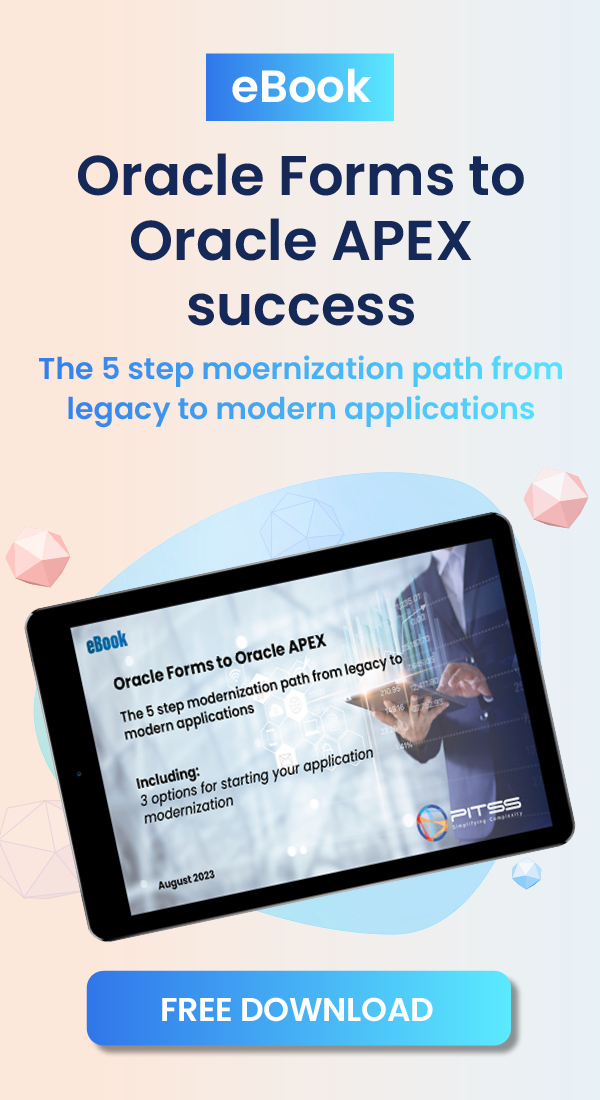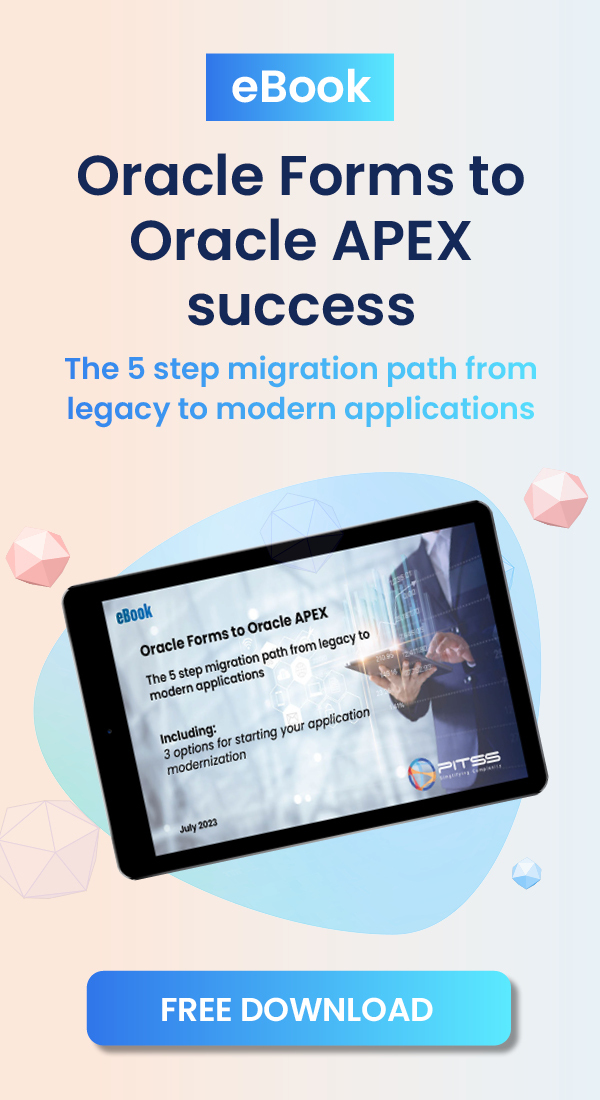Built on PL/SQL, Oracle Forms has been used by many companies and organizations over the years for performing day-to-day operations. Oracle Forms has transitioned from a client/server platform to a web-based platform deployed in Oracle WebLogic Server. With only requiring a download of a JRE (Java Runtime Environment), end users are able to access Oracle Forms applications from any web browser using new technologies such as Java Web Start (JWS) and Forms Standalone Launcher (FSAL). However, due to challenges of organizations maintaining software on PCs and risking potential security breaches through Java, more companies have considered a move away from Oracle Forms or any Java-based platform. Oracle has a solution to this problem, and Oracle Application Express (APEX) is a solution to take into consideration.
Built within Oracle Database, APEX is a low-code development platform which allows you to build and maintain applications which can be accessed worldwide from any device. APEX also has advanced features which allow your application to be more appealing and user friendly without the need of a Java plugin or runtime. APEX is similar to Oracle Forms which it is also built on PL/SQL; thus, APEX greatly reduces a learning curve for developers. Here are some reasons to consider moving from Oracle Forms to APEX:
Similarities Between Forms and APEX
- With APEX also being built on PL/SQL, developers will not need to learn new programming languages such as Java or C# to develop and maintain applications. Training will be minimized due to that APEX is built in the same language as Oracle Forms and that APEX uses a low amount of code.
- APEX allows you to utilize Oracle Database features fully.
- The same database objects may be used in both Oracle Forms and APEX.
Advantages of APEX Over Oracle Forms
- Java is NOT required to be installed on a PC. This means that end users will not need to have a Java Development Kit (JDK) or a Java Runtime Environment (JRE) installed to run an application migrated or built in APEX.
- In addition to applications being able to run from any web browser on a PC or Mac, they can also be run on mobile devices such as phones and tablets.
- Developers will not need to have software installed on their PCs such as Oracle Forms Builder, JDeveloper, or other IDEs to develop APEX applications. Development can be done within a web browser.
- APEX is metadata-based, and source files no longer need to be stored on the server. For example with Oracle Forms, it is required to store executables (FMXs, MMXs, PLXs, etc.) at the operating system level. This is no longer required with APEX. Thus, developers will no longer need any access to the application server.
- Designing the user interface of the applications is much easier with different themes and styles pre-packaged within APEX.
- APEX comes FREE with a license of Oracle Database. If you are migrating from Forms to APEX, you are already using Oracle Database; thus, you will already be licensed with Oracle Database. Best of all, all Oracle Database editions from Express Edition (XE) to Enterprise Edition (EE) support APEX.
- APEX is also compatible with Oracle Database in the cloud including Autonomous Database. Autonomous Database involves running a full Oracle Database in the cloud without needing to manage the infrastructure. With Autonomous Database, common DBA tasks such as patching, backup, and recovery are fully automated. Click here to learn more about Autonomous Database from Oracle.
- Accessing APEX applications requires Oracle REST Data Services (ORDS) which must be deployed to an application server. Unlike Oracle Forms, you are not limited to only using Oracle WebLogic Server to deploy ORDS for accessing APEX. You may also use open source application servers such as Apache Tomcat and Eclipse Jetty. As a result, WebLogic licenses are no longer required for running APEX unless you choose to use WebLogic for deploying ORDS.
Next Steps
If you are not quite ready to migrate your entire application to APEX, it is also possible to migrate a subset of your application to APEX and have it work in tandem with your existing Oracle Forms application. PITSS has seen use cases where APEX and Oracle Forms work together to satisfy customer needs. It is absolutely possible to call an APEX application from Forms and an Oracle Form from APEX.
For more information regarding the prerequisites to consider for setting up and running APEX, please check out our article on the Oracle APEX prerequisites.
If you are considering moving from Oracle Forms to APEX, please contact PITSS today for how we can help support you with your digital transformation of your legacy application.
Oracle has some additional information regarding APEX on Oracle’s website as well as how you can get started with APEX for FREE. Click here to get started with APEX today.

